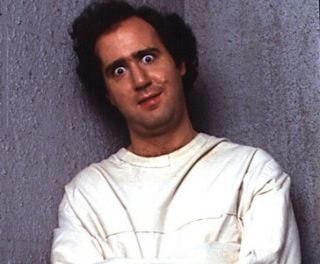Bipolar Disorder
Do Comedians Possess Bipolar Traits?
Stand-up comedians and bipolar disorder
Posted July 11, 2014
I previously discussed the unique personality traits of comedians. A new study looked at the issue from a different angle. Research on other creative people has shown that there is a connection between creativity and psychotic traits related to schizophrenia and mania (half of bipolar disorder). The new study wanted to check if the connection is true for stand-up comedians as well.

The study included 523 comedians (404 men, 119 women, mean age of 31 years), who were recruited through comedy societies, websites, social media and personal invitations by the researchers. As a control group, 364 actors (153 men and 211 women, mean age of 30 years) were also recruited in a similar way to the comedians. Both samples were taken from UK, USA and Australia. The majority of them (57% of the comedians and 73% of the actors) were amateurs. As an additional control, 831 ordinary people (246 men and 585 women, mean age of 31 years) who constitute the average norms in the population for the scales used in this study.
The subjects completed a questionnaire measuring four different aspects of psychoticism (not to be confused with psychopaths).
Here are the descriptions of the scales used in the study from the study itself (with a few changes to simplify):
“a) Unusual Experiences, measuring magical thinking, belief in telepathy and other paranormal events, and a tendency to experience perceptual aberrations
b) Cognitive Disorganisation, measuring distractibility and difficulty in focusing thoughts
c) Introvertive Anhedonia, measuring a reduced ability to feel social and physical pleasure, including an avoidance of intimacy
d) Impulsive Non-conformity, measuring a tendency towards impulsive, antisocial behavior, often suggesting a lack of mood-related self-control”
What the researchers found was the following:
1) Both actors and comedians scored higher than the norms on all four scales, except for actors scoring equal to the norm on Introvertive Anhedonia.
2) Actors were lower than the comedians on Cognitive Disorganisation, Introvertive Anhedonia, Impulsive Non-conformity but equal on Unusual Experiences.
3) Female comedians and actors scored higher than male comedians on all scales except for Introvertive Anhedonia, where they were actually lower than the males.
The study supports the notion that comedians, like other creative people, are high on psychosis traits. The high scores of comedians in all psychotic traits do not mean that comedians (or actors) are psychotic or have mental problems. This is just a survey and not a clinical diagnosis. However, the results might suggest that psychotic characteristics are the basis of stand-up comedy, or that people who pursue comedy as a career (remember, most of the subjects in this study were amateurs) have some characteristics of people suffering from schizophrenia or mania. What is perhaps surprising is the very high scores comedians achieved on these scales compared to other creative people.
The authors interpret the results as showing a strong tendency toward being bipolar. On one hand, the comedians scored high on antisocial and depressive traits, but on the other hand, they scored high on the manic trait, which if true, does characterize people suffering from bipolar. It is important to note that the traits described “represent healthy equivalents of cognitive and temperamental variations which, in pathological form, predispose to and mediate the symptoms of psychotic illness” as the authors put it.
The authors also mention that two of the scales, Unusual Experiences, and Cognitive Disorganisation are associated with creative thinking and generating unusual ideas, traits important for a successful stand-up comedian.
To me, the results of the study illustrate the unique lifestyle of comedians that I discussed previously. On one hand, they have to work hard and travel, mostly alone. This part can be very depressive and lonely. On the other hand, being on stage can be a manic experience if the comedian is successful. If he or she fails, or if the performance is sometimes good and other times bad, the changes in mood are reasonable (though again, not necessarily to the extreme of a person clinically diagnosed with bipolar).
You might also be interested in my other related posts:
Comedians’ Smarts, Humor, and Creativity


